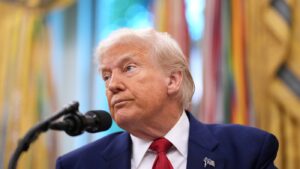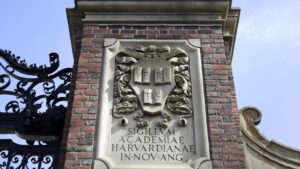Harvard University finds itself at the center of a heated dispute with the Trump administration, which has taken significant actions against the institution, citing concerns about antisemitism. This development has resulted in Harvard losing access to substantial research funding, sparking a legal battle.
In April, the Trump administration froze over $2 billion in research grants to Harvard, additionally attempting to revoke the university’s capacity to enroll international students. Harvard has responded by suing the federal government over these measures, which University President Alan Garber has described as “perplexing.”
Garber remarked on NPR’s Morning Edition, “Why cut off research funding? Sure, it hurts Harvard, but it hurts the country because after all, the research funding is not a gift.” He emphasized that such funding is allocated for what the government considers “high-priority work” and that removing it compromises national interests.
The Trump administration has also urged federal agencies to terminate an additional $100 million in contracts with Harvard by June 6. Despite reaching out for comments, NPR has not received a response from the White House.
Highlighting the university’s contributions, Garber pointed to recent accolades Harvard faculty received from the Breakthrough Prize for groundbreaking work in science, including efforts in obesity, diabetes, and gene editing.
This funding freeze followed Harvard’s refusal to meet administration demands regarding hiring and admissions policies, diversity, equity, and inclusion (DEI) programs, and screening international students for potential anti-Semitic or terrorism-supporting tendencies.
The federal Joint Task Force against antisemitism has stated that Harvard’s actions “reinforce the troubling entitlement mindset that is endemic in our nation’s most prestigious universities and colleges.” They underscore the necessity for these institutions to uphold civil rights laws to continue receiving federal support.
In a recent legal victory for Harvard, a federal judge blocked the administration’s attempt to prevent the university from enrolling international students. Nonetheless, President Trump criticized these students’ home countries on his Truth Social account, claiming they are unfriendly to the U.S. and do not contribute financially to their education.
Interview Insights
During an interview with NPR’s Steve Inskeep, Garber discussed the impact of the administration’s actions on Harvard and the broader implications for research universities. He acknowledged the need to address antisemitism and political diversity issues, indicating that the university is actively working on these challenges.
Garber expressed concern over the administration’s measures, stating, “Shutting off that work does not help the country, even as it punishes Harvard, and it is hard to see the link between that and, say, antisemitism.”
When asked about the university’s compliance with federal requests, Garber asserted that Harvard has provided information in accordance with legal requirements, despite accusations of non-compliance.
Garber also stressed the significance of maintaining a diverse academic environment, noting that international students contribute significantly to the university’s intellectual climate. “Without international students, which is a quarter of your student body, Harvard would not be Harvard,” he affirmed.
Addressing broader perceptions, Garber emphasized the value of research universities, highlighting the substantial contributions they make to scientific and medical advancements.
In response to the administration’s suggestion that federal grants be redirected to trade schools, Garber questioned the rationale behind such a move, arguing that it would impede essential research efforts supported by federal funding.
Finally, Garber recognized the implications of the administration’s actions as a “warning” to other academic institutions, urging universities to remain steadfast in their educational and research missions.
The radio version of this story was produced by Ana Perez.






Be First to Comment